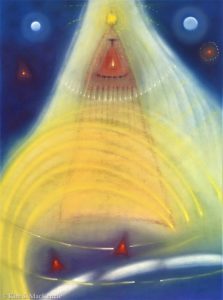 The manner in which the Universal Father sojourns with the creatures of time is the most profound of all universe mysteries; the divine presence in the mind of man is the mystery of mysteries. [Paper 1:4.1, page 26.3]
The manner in which the Universal Father sojourns with the creatures of time is the most profound of all universe mysteries; the divine presence in the mind of man is the mystery of mysteries. [Paper 1:4.1, page 26.3]
The technique whereby the Thought Adjuster is able to make his eternal presence known to the material mind is a mystery. The method in which the spirit registers the reality of eternity in the material mind as an experience of “the everlasting now” is a philosophic miracle beyond our understanding. (1295:1) However, the technique used by the material mind in its reach upward and inward for the experience of the presence of God, the psychological behavior of the human mind in fostering its own spiritualization, is not completely beyond our grasp.
Without intention of intruding upon the supremely personal and sacred domain of spiritual experience, this essay will attempt to outline the psychological evolution of religious experience as it is revealed in the progressive development of prayer and worship with a special regard for the role of the creative imagination in the spiritualization of the mind of man. Philosophical discussion and description of spiritual experience reduces such living experience to the levels of psychology with the intention of enlightening thought and with the hope that this enlightenment will contribute to the further growth of spiritual character.
While the mind is not the seat of the spiritual nature, it is indeed the gateway thereto. [Paper 155:6.13, page 1733:2]
The Alter-ego Concept
Children, when first learning to make use of language, are prone to think out loud, to express their thoughts in words, even if no one is present to hear them. With the dawn of the creative imagination they evince a tendency to converse with imaginary companions. In this way a budding ego seeks to hold communion with a fictitious alter ego. By this technique the child early learns to convert his monologue conversations into pseudo dialogues in which this alter ego makes replies to his verbal thinking and wish expression. Very much of an adult’s thinking is mentally carried on in conversational form. [Paper 91:3.1, page 996:8]
In time the alter-ego concept is exalted to a superior status of divine dignity, and prayer as an agency of religion has appeared. [Paper 91:3.2, page 996.9]
…It is altogether fitting that man, when he prays, should strive to grasp the concept of the Universal Father on Paradise; but the more effective technique for most practical purposes will be to revert to the concept of a near-by alter ego, just as the primitive mind was wont to do, and then to recognize that the idea of this alter ego has evolved from a mere fiction to the truth of God’s indwelling mortal man in the factual presence of the Adjuster. . . [Paper 91:3.6, page 997:5]
The conversational form of language is the dominant form of thought: to think reflectively usually means to think in the verbal forms of conversation. With the dawn of the creative imagination the child then begins to converse with an alter ego. And this alter ego, the son of the creative imagination, may evolve toward a status of divine dignity, eventually becoming the experiential fact of the eternal presence of God in the temporal mind of man. The divinely ordained (but not necessarily inevitable) destiny of the alter ego from its moment of conception can only signify the direct intervention of spirit influences, circuits, and entities in the creative imagination and upon the concept of the alter ego.
Adjuster Communication Through the Creative Imagination
It is the action of these spirit forces in the creative imagination which is partially responsible for the mysterious, vital, and dynamic power of the creative imagination. Psychologists are usually prone to declaring that unconscious levels and phases of mind find expression in the self-conscious mind through the imagination. This is the modern explanation for dreams, compulsive behavior, and other psychological behavior. Our spiritual teachers confirm this conclusion, as far as it goes, but make some additional comments regarding the creative imagination.
Supreme and self-acting Adjusters are often able to contribute factors of spiritual import to the human mind when it flows freely in the liberated but controlled channels of creative imagination. [Paper 109:5.1, page 1199.2]
Certain abrupt presentations of thoughts, conclusions, and other pictures of mind are sometimes the direct or indirect work of the Adjuster. . . [Paper 110:4.3, page 1207.3]
The races on some worlds have one gland, on others two, as do Urantians, while on still other spheres the races have three of these unique bodies. The inherent imagination and spiritual receptivity is definitely influenced by this differential chemical endowment. [Paper 49:5.11, page 566.7]
The volunteering Adjuster is … interested in … Spiritual perception. The prospects of reverential development, the birth and growth of the religious nature. What is the potential of soul, the probable spiritual capacity of receptivity? [Paper 108:1.3, page 1186.1]
…We do observe that the more experienced Adjuster is often the indweller of the higher type of human mind; human inheritance must therefore be a considerable factor in determining selection and assignment. [Paper 108:1.1, page 1185.3)
True religious worship is not a futile monologue of self-deception. Worship is a personal communion with that which is divinely real, with that which is the very source of reality. [Paper 196:3.22, page 2095.6]
Worship is the act of the son’s personal communion with the divine Father, the assumption of refreshing, creative, fraternal, and romantic attitudes by the human soul-spirit. [Paper 143:7.8, page 1616.10]
The human Jesus saw God as being holy, just, and great, as well as being true, beautiful, and good. All of these attributes of divinity he focused in his mind as the will of the Father in heaven. [Paper 196:0.2, page 2087.2]
The Thought Adjuster does attempt to communicate, however obliquely or subtly, with the material mind through the creative imagination. This, in fact, seems to be the primary channel of communication with the material mind, since one of the mind attributes in which the Adjuster is very interested is the capacity for spiritual receptivity, which is definitely linked to the human imagination, and which, in turn, is directly influenced by the chemical function of genetic endowment. Worship is not a delusion of the imagination, but a communion with a divine alter ego which is actually indwelt by the spirit of God, the loving gift which the Father makes of himself to the least of his children. Although this spirit may be more or less invisible beneath the surface of the various forms of this divine alter ego, nevertheless, …the faith-grasp of the God-knowing mortal can achieve the philosophic miracle of the recognition of the Infinite by the finite, the discernment of the eternal God. (1:4.7, 27.2)
Combined Psychologic and Spiritual Techniques
While we do not understand the spirit technique that directs and adjusts the directionization of the growth of the alter ego towards the actuality of the presence of God, we know that this growth does take place in the creative imagination as far as self-conscious experience is concerned, and in the morontia soul as far as superconscious experience is concerned.
Prayer ever has been and ever will be a twofold human experience: a psychologic procedure interassociated with a spiritual technique. And these two functions of prayer can never be fully separated. [Paper 91:3.6, page 997.4]
The psychologic procedure is the intentional focusing of the creative imagination on the reality of God, which faith identifies as the concept/ideal of the divine alter ego. The spiritual technique results in the gradual and evolutionary exaltation of this ideal alter ego in the creative imagination towards ever-ascending levels of perfection – even to the very presence of God. And these two functions can never be fully separated any more than water can be separated from the cells of a living organism. The psychologic procedure and the spirit technique are unified in the creative imagination, in the inner life, in the heart of man, in a living and growing experience.
This is why Jesus always endeavored to teach others to pray from the heart instead of reciting set prayers. Only reluctantly did he teach his apostles formal prayers. Ritual may stimulate the creative imagination in a religious direction initially, but religious formalizations inevitably stagnate and lose their vitality unless the religionist discovers the factual presence of the Father in personal experience.
It is not so important that you should know about the fact of God as that you should increasingly grow in the ability to feel the presence of God. [Paper 155:6.12, page 1732.5]
This living and personal conversation/communion between the mind of man and the spirit of God through the channel of the alter ego in the creative imagination is entirely dependent upon the choosings of the mortal will. And when an individual chooses to enthrone God in the center of his or her inner life, that individual chooses the will of the Father.
The doing of the will of God is nothing more or less than an exhibition of creature willingness to share the inner life with God – with the very God who has made such a creature life of inner meaning-value possible. Sharing is Godlike – divine. [Paper 111:5.1, page 1221:2]
To know the idea of God is one thing. To worship the ideal of God is another. And to share the temporal, experiential, finite reality of God with the eternal, existential, and absolute Thought Adjuster is still another thing altogether.

